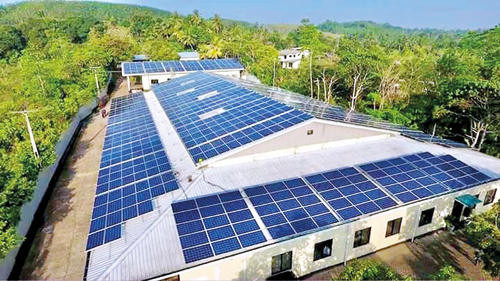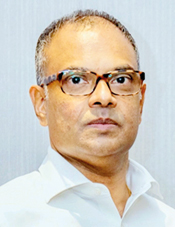BPPL gearing for third phase expansion

View of BPPL's Eco Spindles factory where solar power panels have been installed
BPPL Holdings PLC, makers of sanitary and janitorial products, having completed its second phase of expansion is gearing for the next phase to set up a factory within the next 18 months.
“We want to set up a factory for yarn and brush manufacturing in one of the industrial zones,” BPPL Managing Director Dr. Anush Amarasinghe told the Business Times in an interview this week. He said the factory which was set up in the second phase of the company’s expansion saw a 120 per cent increase in capacity to 1,440 tonnes per annum from 660 tonnes per annum.
The company’s business model to offer solutions to plastic waste issues has seen an unprecedented demand for PET (polyethylene terephthalate) bottles that end up in landfills or the Indian Ocean where it can take over 1000 years to degrade. As BPPL uses 15-20 per cent of PET plastic imports to Sri Lanka (in virgin form) in their polyester yarn and it has been a win- win for the company as well as the environment, Dr. Amarasinghe noted.
The brush filaments are made with PET bottles and polypropylene which is the second-most widely produced commodity plastic.

Dr. Anush Amarasinghe
Dr. Amarasinghe said the company uses 3000 tonnes of plastics annually. He added that the company wants to double this within the next three years. The polyester yarn demand in Sri Lanka is currently 10,000 tonnes. Major global sportswear makers use it for their shoe uppers, t-shirts etc. Dr. Amarasinghe noted that it takes 10 bottles to manufacture a t-shirt, 27 for a graduation gown and 63 for a sweater.
“We supply only 700 tonnes currently to the apparel manufacturers in the country which is 7 per cent of the demand and there is more room to increase this while the demand keeps growing.”
He noted that in this regard the company is doing a complete rollout of plastic collection centres. “We already have 17 centres and within three years we want to bring it to 40 centres. We are also supplying infrastructure to the small and medium entrepreneurs who run these collection centres.” Each centre has about 50 to 75 collectors, he said noting, “the issue is that we are not recycling enough which is why we need to increase the centres”.
The company is now collecting multiple forms of waste such as paper and glass and re-directing them to paper / glass manufacturers.
The group supplies brushes for professional use where cleaning is far superior to domestic cleaning needs such as construction, oil and gas and food (McDonald’s, Burger King and Starbucks). All their industrial products are exported to places such as the US, Canada, Australia and New Zealand. They also have a strong presence in the Netherlands and UK.
In Q12021/22 BPPL’s consolidated revenue was Rs. 1 billion, up over the corresponding period in the previous year by 70 per cent. The net profit for the period was Rs. 99 million, up by 65 per cent, although starting from a low base relating to 2020 coronavirus issues.
Dr. Amarasinghe that the government’s decision to ban single use plastics was a step in the right direction in becoming more environmentally conscious.


